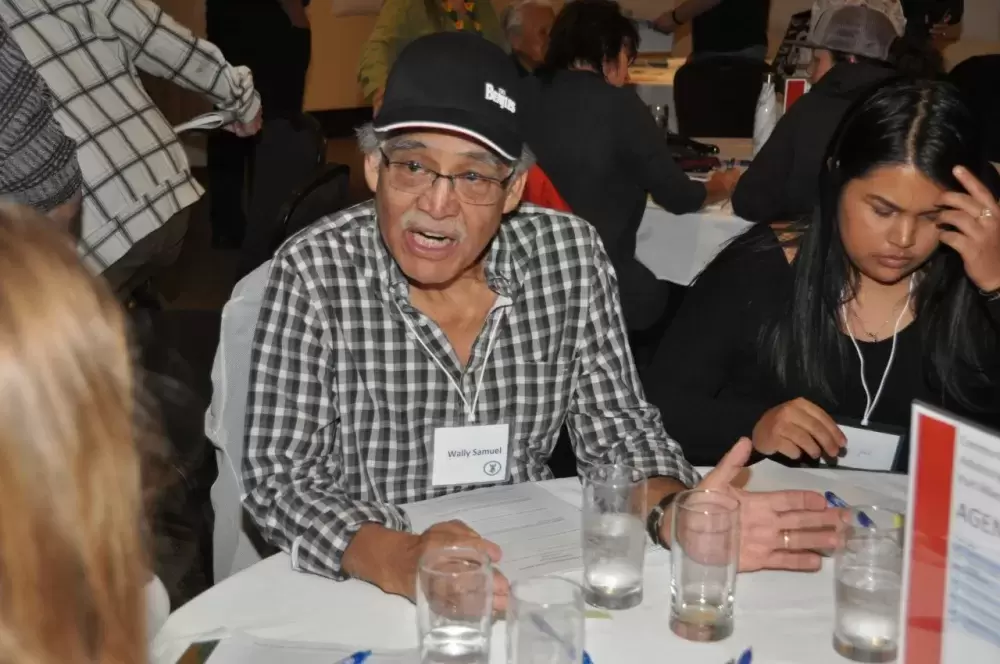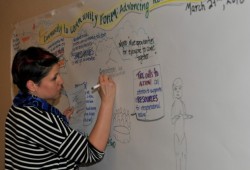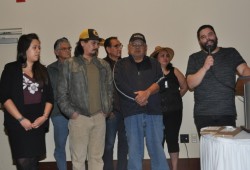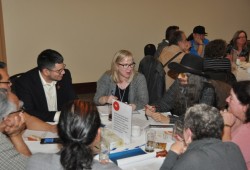The City of Port Alberni, in partnership with Tseshaht and Hupacasath First Nations, co-hosted a Reconciliation Forum at the Best Western Barclay on March 27 to consider what a “reconciled” community would look like.
The event marked the one-year anniversary of the high-spirited Walk for Reconciliation that saw Indigenous and non-Indigenous citizens march up Argyle Street to City Hall, where a delegation led by Tseshaht Chief Councillor Cynthia Dick and then-Hupacasath Councillor Jolleen Dick delivered a presentation to city council.
“We’re really looking for everyone to guide where we go from here, in exploring this path of reconciliation,” Dick said.
Dick said, following the walk, the city resolved to form a committee to determine how to bring Nuu-chah-nulth-aht into full membership in the Port Alberni community and to integrate the growing Nuu-chah-nulth economy with that of the city. But the picture is so clouded, it will take some serious consultation to determine what reconciliation would entail, she explained.
“A lot of people, when you say ‘reconciliation,’ say, ‘How do you rebuild something that never existed to begin with?’” Dick said, referencing the legacy of the Alberni Indian Residential School. “Many of our community members have been affected by intergenerational traumas of colonization.”
Dick said her working definition of “reconciliation” is “co-existing in harmony.”
“We drew dividing lines for quite a while,” she said. “Now it’s time to bring people together to find solutions, find out how we move forward together, how we will do our best to leave a good path for our children and our future generations. To learn from the history and create a community where everybody has an opportunity to live a good life.”
Following the 2017 walk, City Councillor Sharie Minions was appointed to co-chair the Reconciliation Committee with Cynthia Dick. Minions said it has been a steep learning curve.
“A lot of it has been just building relationships with the people across the table and starting to understand where each of us are coming from,” Minions said.
Minions said as a young, (almost) life-long Port Alberni resident, she finds it distressing that she never learned about the injustices and inequities endured by her Nuu-chah-nulth neighbours living within plain sight. It was a history that was never taught and never mentioned, she said.
The Forum attracted 112 members of the community, according to City of Port Alberni communications manager Alicia Puusepp. The event followed the World Café model, she explained. Nine active tables were planned, each with an individual question for discussion and feedback. A facilitator and note-taker was designated for each table.
The questions were also posted along one wall, with an invitation for attendees to write their feedback directly on paper.
Port Alberni Mayor Mike Ruttan said the Reconciliation Committee was formed in the wake of the failed attempt to re-name city streets dedicated to historic figures such as MP A.W. Neill, who are now recognized as oppressors of First Peoples.
“It was a process that we started – and faltered at,” Ruttan said. “It started a lot of dissention in the community and it clearly wasn’t leading us in a healthy direction as a community. So we decided to re-think the whole process.”
Ruttan said at this point, the community “is ready to get together on a much larger basis.” That includes comprehensive community consultation, he explained, and the Reconciliation Forum is an ambitious first step.
“Port Alberni is the gateway to Nuu-chah-nulth culture,” he said in his opening remarks. “The question is, what do we want that gateway to look like? How are we going to show the rest of the world that we are moving ahead?”
Mid-Island-Pacific Rim MLA Scott Fraser serves as Minister of Indigenous Relations and Reconciliation. Fraser said Port Alberni has taken a lead role in determining what reconciliation would look like. The province would ultimately create any future reconciliation program on the Port Alberni model, he added.
Prior to the opening of the discussions, Cynthia Dick was asked whether Nuu-chah-nulth have a growing position of strength, in recognition of treaty settlements and court decisions affirming First Nations’ rights surrounding natural resources and the environment.
Dick said that is one factor, but she believes it is important that non-Indigenous people recognize that Nuu-chah-nulth nations always had a sophisticated social structure that holds lessons for contemporary society.
“Our people always came from a place of strength,” she said. “That is one thing I want to acknowledge: our ancestors, our elders, our knowledge-keepers, they held on to who we are as Indigenous people; they held onto our values, our teachings, our traditions, our songs, our dances, our language, in the darkest of times. And they held on, out of strength. And now it is up to us – everyone who is here today, to breathe life into that.”
Hupacasath Chief Councillor Stephen Tatoosh said he has served as an advisor to the committee.
“I am optimistic and cautious at the same time,” Tatoosh said prior to the official welcoming. “I mean, we are all here to live together, so why not work together?”
Tatoosh agreed that First Nations are dealing more and more from a position of strength, and “reconciliation” includes improving conditions for his nation.
“Hupacasath are a progressive nation. We’ve been here for the last ten thousand years, and I feel we really have something to contribute to Port Alberni,” he said.
As a sign of that growing community leadership, Huu-ay-aht member John Jack currently serves as chair of the Alberni-Clayoquot Regional District. Jack noted that while the regional district does not have an official role on the Reconciliation Committee, it is paying close attention.
“The [Alberni] Valley is leading the way on reconciliation, at a number of different levels,” he said. “Mostly, we talk about treaty, or court cases. That is legal/political reconciliation. But this, I see as social and economic reconciliation.”
Jack said, legally speaking, it is now accepted that protection of the environment largely depends on First Nations, who hold resource rights enshrined within the Constitution.
Under the forum format, attendees selected a numbered table for a timed 15-minute discussion, led by a facilitator. Timekeeper Alicia Puusepp (with obvious relish) tapped out the beginning and end on a drum.
As the discussions progressed, it was notable in the role Nuu-chah-nulth elders played in the process. When elders spoke, people listened, perhaps more receptively than they might have in times past.
At one table, the posted question was: What can the community do to advance reconciliation in Port Alberni? As Cliff Atleo emphasized to a rapt audience, “Keep it simple.”
At a different table, Ahousaht elder Wally Samuel recounted his arrival in Port Alberni in 1965, where he found a job, “for a buck-and-a-half an hour.” Samuel described the working conditions and the social conditions he found himself living in. It was not a good time to be a young Nuu-chah-nulth in Port Alberni.
At the table was a relative newcomer to Port Alberni named Jane Sawyer, who relocated from North Vancouver last year to teach at Vast.
“I’ve learned more in the last seven-and-a-half minutes than I ever knew about Port Alberni,” Sawyer told the table, “And I’ve read [Jan Peterson’s] books about Port Alberni.”
Speaking to Ha-shilth-sa minutes later, Samuel said he was impressed with the turnout and the interest being shown by non-Indigenous citizens.
“They want to learn and work together,” he said. “Same with us, we want to work together. I’m really glad we have this diverse group that came here.”
Samuel said for people to come together across this divide, it is important to sit down, face-to-face.
“Not learning it from the news, or from books,” he said. Samuel, a survivor of the Alberni Indian Residential School, said while he is used to being listened to in controlled situations such as classrooms or workshops, he was surprised by the level of engagement he received from ordinary non-Indigenous people.
“For people from at-large, this is new,” he said.
Puusepp said, following the forum, the committee would produce a summary of the feedback, which would then be sent out to all registered participants.










